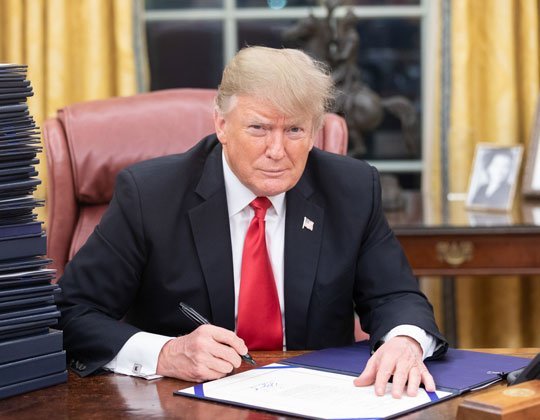In a dramatic policy shift, as one of his first acts as US President, Donald Trump declared a national energy emergency, initiating a series of executive orders aimed at revitalizing fossil fuel industries. This move starkly contrasts with the previous administration’s emphasis on renewable energy and environmental sustainability.
Trump’s controversial actions include withdrawing from the Paris Climate Agreement, halting federal support for electric vehicles (EVs), and suspending offshore wind energy projects. These decisions have sent shockwaves through the green economy, raising concerns about the future of renewable energy initiatives in the US and the knock on effect this may have elsewhere.
Elon Musk: The Green Billionaire in Trump’s Corner
Despite federal policy reversals, entrepreneurs like Elon Musk—who remains a close Trump ally—continue to champion the green economy especially as he has been in charge of the Department of Government Efficiency. Musk’s relentless pursuit of sustainable technology has propelled Tesla to unprecedented heights, with the company becoming the most valuable auto brand in history.
Tesla’s sales have surpassed two million vehicles, and the Cybertruck has garnered over two million confirmed orders with non-refundable deposits. However, the State Department announced earlier this month it is abandoning plans of purchasing $400 million worth of armoured Tesla vehicles, with no plans of fulfilling the contract.
Nevertheless, Musk recently announced a ground-breaking green project in collaboration with the UAE at the World Government Summit, securing billions of dollars in investments for both the US and UAE economies. Referring to the underground Dubai Loop project, Musk revealed “It’s going to be like a wormhole, you will wormhole from one part of the city and then, boom, you are out on another part of the city.”
While federal policies shift, numerous US states have reaffirmed their commitment to renewable energy. More than 31 states, including traditionally conservative ones, are actively engaged in large-scale clean energy projects.
For instance, West Virginia, despite its historical reliance on coal, is witnessing a surge in wind energy developments. These state-led initiatives highlight a decentralized approach to sustainability, suggesting that the momentum of the green economy may persist independently of federal directives.
A Call for Shared Responsibility
Washington’s withdrawal from international climate agreements places increased pressure on other major emitters, such as China, India, and Russia, to intensify their efforts in combating climate change.
Trump’s stance indicates a desire for these leading BRICS nations to contribute more significantly, both in action and financial support, rather than relying predominantly on US funding for global environmental initiatives.
Trump, alongside Musk, is intensely focused on curbing the ballooning US federal debt and limiting government spending, including on federal green projects such as the EV charging infrastructure. Instead, they advocate for state and private enterprises to take the lead through investment-driven strategies like Tesla’s highly profitable and efficient charging network. Additionally, Trump has pushed for major tech companies, including their data centres and AI solutions, to contribute significantly to sustainability efforts.
This approach mirrors models in the UAE and Europe, where energy responsibilities have been decentralised, resulting in successful state and private energy entities.
MENA Embracing Profitable Sustainability
Middle Eastern countries, notably the UAE, are adopting business-oriented strategies for their green transitions. Projects by companies like Masdar and AMEA Power are designed to provide energy solutions, generate employment, and ensure clear returns on investment.
The UAE has also successfully leveraged public-private partnerships (PPPs) to fund EV infrastructure projects. Saudi Arabia and Oman are following suit, while micro solar parks are emerging as viable independent solutions. Projects such as Al Masaood’s remote solar initiative in Fujairah demonstrate the growing trend of commercially viable green investments.
This pragmatic approach aligns with the current US administration’s emphasis on financially sound environmental initiatives, suggesting a potential area for international collaboration based on mutual economic benefits.
As such, the MENA and wider Global South must look to financially sustainable green projects—such as those led by Masdar, AMEA Power, or SkyGlobal—that deliver both energy security and economic benefits to their local communities.
The future of the green economy under Trump will be shaped by a balancing act between economic pragmatism and environmental responsibility. Federal support for sustainability may be waning, but state policies, private sector innovation, and international partnerships will continue driving progress.
If green solutions can prove profitable, they will thrive—regardless of who sits in the Oval Office. The Middle East, particularly the UAE and Saudi Arabia, offers a compelling case study in how governments and businesses can work together to develop profitable, scalable green energy solutions.
By: Sal Jafar, CEO of ESG Mena



